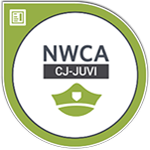PURPOSE
The Juvenile Justice credential documents the essential competencies for criminal justice professionals who work with youth in the juvenile justice system and youth victims of crime.
AUDIENCE
This credential documents the essential competencies for criminal justice professionals who work with youth in the juvenile justice system such as social workers and professionals in the social services arena, probation officers working with juvenile offenders, staff of residential treatment centers and group homes, staff within the juvenile court system, law enforcement professionals, mental health and substance abuse professionals, and others who work directly or indirectly with youth in the juvenile justice system and victims of crime.
JOB/CAREER REQUIREMENTS
These professionals assist youth through the juvenile justice system. Many advocate for youth well-being and care and assist youth once they have been released from the juvenile justice system. An understanding of Juvenile Justice is important for all professionals involved in the juvenile justice system including proper treatment and interaction with youth offenders and victims; assisting youth through the numerous steps of juvenile pre-trial, trial, sentencing, and corrections process for various levels of crime; and advocating for juveniles who find themselves in adult court. Successful juvenile justice workers understand the statistical trends and measurement methods of juvenile crime, the numerous types of theories related to juvenile offenders and related crime, and strategies used for prevention and control of juvenile crime. They also understand gang related behavior and adolescent drug use and related crime. Juvenile justice professionals are often involved in juvenile probation, the juvenile correctional system, and juvenile aftercare.
JUVENILE JUSTICE WORKPLACE TASKS
- Law enforcement professionals work with juvenile offenders and victims of crime
- Juvenile court staff assist juveniles through the court system
- Child, family, and school social workers advocate and advise juveniles in areas related to juvenile offenders and victims of crime
- School principals, teachers, and counselors must work with juveniles involved in the juvenile justice system as well as juvenile victims of crime
- Juvenile probation officers and correctional treatment specialists work with juvenile offenders
- Substance abuse and behavioral counselors often work with juvenile offenders and victims of crime
EXAM STRUCTURE OVERVIEW
Number of Questions in Exam: 130
Time Limit for Exam Parts:
- Juvenile Delinquency: 45 items
- The Juvenile Court System: 85 items
Total Time: 120 minutes
Overall Passing Score: 70%
(All sections require an individual passing score of 70%)

